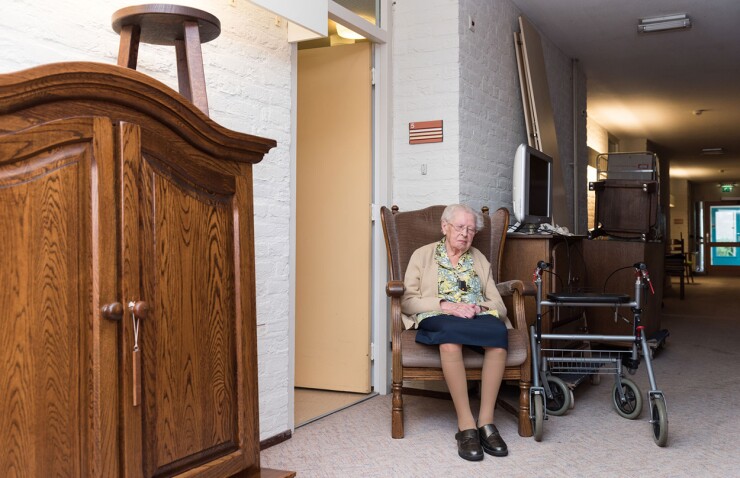DALLAS — Facing a “silver tsunami” of aging baby boomers, Texas nursing homes are seeking more Medicaid funding when the state legislature convenes in January.
“Texas’ history of chronically underfunding long term care is producing barriers to quality care and is setting up serious consequences as a Silver Tsunami of baby boomers looms on the horizon,” said Kevin Warren, President and CEO of the Texas Health Care Association.

Texas nursing homes receive one of the lowest nursing home Medicaid reimbursement rates in the nation, almost $10,000 short of the cost of care on an annual basis per Medicaid resident, according to THCA. More than two-thirds of all residents in Texas nursing homes rely on Medicaid to cover their costs after depleting their assets.
Skilled nursing and long-term care facilities in Texas are often financed with low investment-grade debt, junk bonds or unrated debt.
“Medicaid reimbursement has not kept pace with general expense growth,” Fitch Ratings analysts wrote Nov. 19 when it affirmed its BB-plus rating on $54 million of revenue bonds issued for the Christian Care Centers in North Texas. The debt, issued through the Mesquite Health Facilities Development Corp., retained a negative outlook.
“The facilities that have exposure in skilled nursing are struggling with Medicaid,” said Fitch analyst Paul Rizzo. “In Texas it may be a little more acute than other states but it’s not unique.”
A recent THCA study said the average shortfall in Medicaid funding per patient per day came to $26.91.
“The state’s Medicaid reimbursement rate for Texas nursing homes has been lower than the actual cost to care for a resident since 1994, and the funding gap continues to grow,” the THCA study said. “The toll of the per-patient, per-day shortfall is mounting, destabilizing the nursing home industry by inhibiting operators from investing in their workforce and making much-needed improvements to their facilities.
“The continued underfunding has fueled a workforce crisis in Texas nursing homes, affecting the quality of care they are able to provide,” the report added. “Dedicated staff are leaving the nursing home industry and not returning due to low wages, demanding job responsibilities and an over-demanding regulatory environment. Texas nursing homes have some of the highest caregiver turnover rates in the country, causing the industry to fall below national averages in survey, quality and staffing measures.”
According to federal records, Texas leads the nation in the number of nursing homes punished by payment suspensions. Over the past three years, Texas nursing homes were penalized 260 times, representing 21% of all Texas facilities. Texas ranked second for the number of serious deficiencies per nursing home.
An attempt to increase funding in the 2017 Legislature fell victim to delays and legislative deadlines as House Bill 2766 failed to get a vote in the Texas Senate.
The Texas Legislature, which meets in regular session only in odd-numbered years, will convene in Austin in January.
“We are profoundly disappointed this smart, practical plan for improving nursing home care in Texas did not pass,” Warren said when the 2017 measure failed. “Texas nursing homes will continue to struggle with underpayment and quality of care will suffer. For those of us who have dedicated our lives to improving long term care, this is heartbreaking.”
HB 2766 would have boosted long term care funding in Texas without any additional state spending. The bill would have allowed nursing home owners to put up their own dollars to draw down federal dollars Texas now loses.
Half of the funds would have been tied to improved quality of care with the remaining funds used to address the shortfall between the cost of care and what the state reimburses, according to THCA.
The bill, carried by family practice doctor State Rep. J.D. Sheffield, R-Gatesville, and Sen. Juan Hinojosa, D-McAllen, enjoyed broad bipartisan support passing the House of Representatives by a wide margin. It was also supported by AARP Texas.
“The families of the more than 90,000 Texans who will go to sleep tonight in a nursing facility also have reason to be disappointed by the state Senate’s lack of action,” Warren said. “It is regrettable that Texans who rely on our state’s nursing facilities were not one of this Legislature’s priorities.”
Forty-three other states have programs in place to supplement long-term care funding similar to the one that failed to get a vote in Texas in 2017, according to THCA.
“It’s hard to improve when you can’t make investments in training, or facility upgrades, and your staff turnover is more than 90 percent because direct care staff can make more working at a fast food restaurant,” Warren said.
While Texas boasts the second-lowest median age among the 50 states, more than 12% of the Texas population is over 65, and the number is growing. According to the Texas Demographic Center, the over-65 population across the state is projected to increase by more than 262% by 2050.
According to data from the Alzheimer’s Association 2018 Texas Facts and Figures, over 380,000 of the state’s residents have already developed Alzheimer’s disease or other dementia. In Texas, Alzheimer’s is the sixth leading cause of death, and its prevalence is expected to increase by almost 30 percent by 2025.
“These factors will place an enormous strain on an industry that is already reeling from a workforce crisis, with more than 97% annual turnover for certified nurse aides,” the THCA said.
Prospects for relief are improved by the fact that Texas is flush with revenue this year, enjoying record sales tax collections every month of 2018 through October. However, public school funding is expected to draw most lawmakers' attention.
“We will not give up. This is too important to too many Texans,” Warren said.





